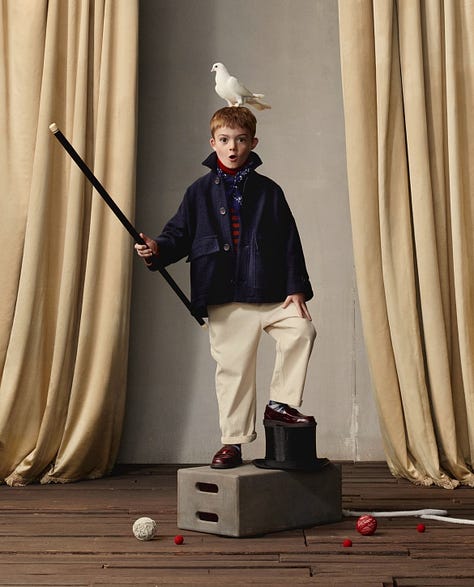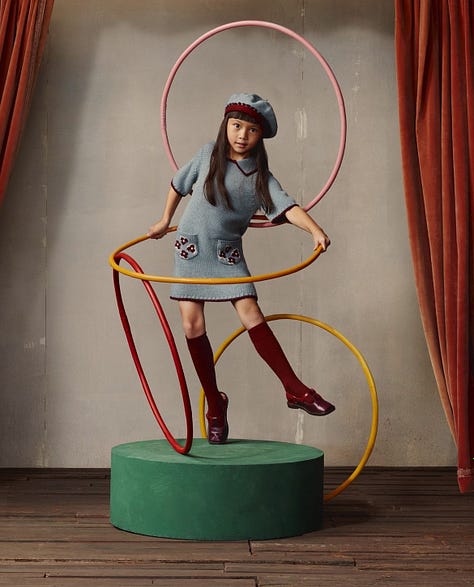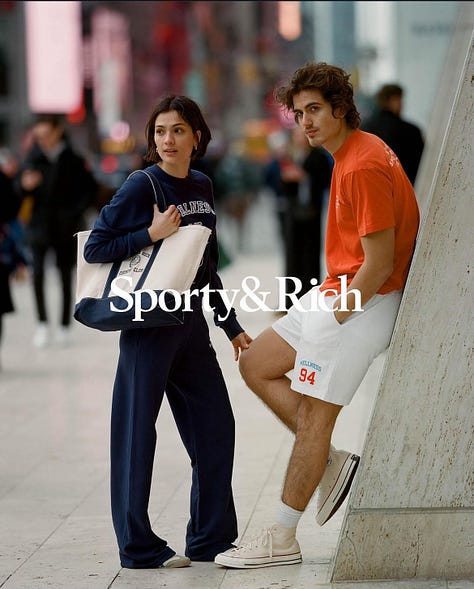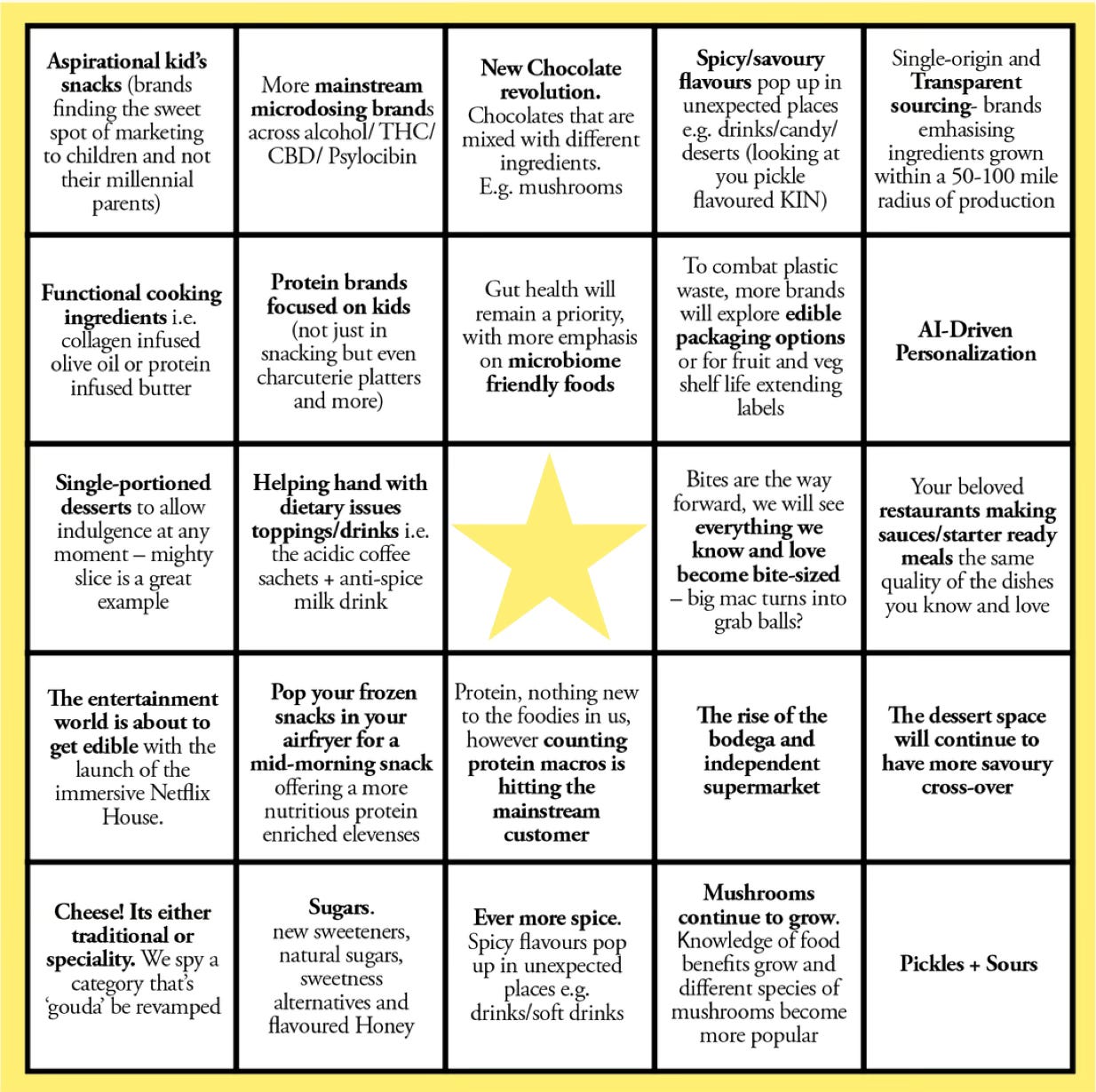QUICK HITS
Elon Musk offers $1 million daily prize for signing his petition
Chief, the networking group for executive women, has laid off staff
X is changing its privacy policy to allow third parties to train AI on your posts
I, too, cannot stop watching SNL’s "Bridesmaid" sketch. I replayed different versions of the video so many times this weekend—on TikTok and YouTube. And then I fell down a Domingo-sized rabbit hole. We love a short king.
I’ve heard only greeat things about Anora, the Neon-produced movie about a sex worker from Brooklyn who gets her chance at a Cinderella story when she meets and marries the son of an oligarch. After its Cannes Film Festival premiere in May, Variety predicted that 25 year old breakout star Mikey Madison would receive a Best Actress Oscar nomination. Critics raved that her performance is “towering” and “a revelatory force of nature.” Speaking to The Cut, Mikey said she didn’t have to audition for Anora—director Sean Baker loved her performances in Once Upon a Time and Scream and invited her to develop the character with him. I saw this post on Instagram about how most of the young supporting cast of Once Upon a Time in Hollywood has since broken out as huge stars: Austin Butler, Sydney Sweeney, Victoria Pedretti, Maya Hawke, Margaret Qualley, and now Mikey Madison. Mikey also doesn’t have Instagram, which I think is hot.


By 30, Noor Alfallah had dated Mick Jagger (81), billionaire investor Nicolas Berggruen (63), and maybe even Clint Eastwood (94). After sitting next to Sleepless in Seattle producer Lynda Obst at a dinner party, she landed a job as a vice president of her production company. She has a son with 84-year-old Al Pacino, who pays $30,000 a month in child support. “I was born in the wrong generation,” she told Vogue Arabia. “I’ve been an old soul all my life. I have friends who are 70 years old; men and women who are just totally my friends who I love, who I’d rather be with than people my age.” Noor was an executive producer on the Trump biopic, The Apprentice. She sounds fun, and this is the kind of content I want from AirMail.
Kylie Jenner’s RTD brand Sprinter hosted a pop-up this weekend in NYC, and maybe five people posted about it. Usually, with these things, you get pictures of lines snaking around the block, fans posing for selfies… we got this.
Just as we knew would happen, someone’s gone and created an app to help you track all those supplements you love taking. SuppCo, founded by GroupMe and Splice co-founder Steve Martocci, helps people find trusted supplements and track their health progress. They’ve already raised $5.5 million in seed funding. Steve said he got the idea at a dinner party when a friend told him that she’d spent four hours that day organizing her supplements. The global dietary supplements market has an estimated value of $180 billion or more, but supplements aren't regulated in the U.S. the way other drugs are. SuppCo will give each supplement a TrustScore based on their total ingredient lists and consumer reviews. Love this, because companies can start selling supplements without FDA approval, and I'm scared some of you are getting poisoned. The app will also have community features that allow people to share their supplement routines with other users, but that’s just weird, no?
I’m kind of obsessed with Juicy Brick, a B2B Food & Bev innovation agency I discovered over the weekend. I got my hands on their 2024 annual trend report, where they highlighted many of the F&B trends I love to discuss in the newsletter—the rise of the private label (small brand aesthetic packaging meets big retailer distribution power), convenience is king (Costco’s Apocalypse bucket, snacking as a lifestyle, liquid diets), dystopian wellness (fave topic), dairy’s comeback, and frozen food’s rebrand. They also made this 2025 predictions F&B bingo card and I think I’ve clocked half of these in the newsletter already.
Would you trust a self-hypnosis app? Companies like Reveri, HypnoBox, and Oneleaf are banking on it. This is a fun one. Reveri’s app has a library of interactive recordings created using Alexa, and this year introduced Hypno-Pharmacy—a support tool that assesses concerns through an online problem tracker and delivers a bespoke self-hypnosis prescription. For $89.99 a year, users can try out sessions designed to relieve stress and anxiety, combat insomnia, or improve focus. Reveri’s sign-ups grew 50% last year. HypnoBox, another self-hypnosis app, nearly doubled its revenue and saw a 394% increase in subscription rate. I’m mildly amused; people really want to be ~well~. There seems to be a big market for on-demand, tech-enabled therapy right now—of course, apps like Calm, Headspace, and BetterHelp fall into this category, and now we have self-hypnosis, I guess. According to Reveri’s founder, about 20% of the population retains high hypnotizability in adulthood. Something about being a super imaginative kid.
A few tax brackets up, a different category of highly suggestible individuals are following the gospel according to Bryan Johnson and undergoing plasma exchange therapy. Initially used for health emergencies and autoimmune disorders, wellness clinics are now offering the treatment for anywhere between $5,000 to $10,000—sometimes more. Former NFL star Troy Aikman called it "essentially a human oil change." Bless his heart.
The White House announced today that it would propose new rules under the Affordable Care Act requiring insurers to cover OTC birth control at no cost to patients. The rules would include emergency contraception, a newly approved non-prescription birth control pill, spermicides, and condoms. The ACA requires most private health plans to cover contraception without co-payments, but this provision applies only to prescription birth control pills, which weren't available when Obama signed the measure into law in 2010. Last year, the FDA approved an over-the-counter birth control pill for the first time. If passed, the rule would affect 52 million American women of reproductive age who rely on private health insurance. Jennifer Klein, the director of the White House Gender Policy Council, called this “the most significant expansion of contraception benefits.”
Zara launched a new section on its site this week called Z3D, targeted at tweens (s/o
). The styling is both casual and preppy—my 14 year-old sister is a fan. You all know I find Zara’s market positioning fascinating. I’m noticing how they’re able to target different demographics while maintaining their brand language. Obsessed with the assets for their FW24 children’s collection and the way they refer to kids as “future adults” in the social copy.


Two interesting pieces about kids and interior decor today: Architectural Digest wrote about parents being divided on whether neutral nurseries and toys are washing out the fun of childhood, while the Wall Street Journal covered the trend of Gen Alpha kids driving interior decisions around the house more than ever. “Houston interior designer David Euscher thinks the pandemic made everyone more aware of how they live in their own environments and how spaces influence behavior.” So true. I think the beige trend is weird. It’s like the mommy-and-me version of millennial gray. Never met a kid who didn't love primary colors.
The global chocolate shortage is coming for Halloween. According to the producer price index, the price of chocolate and confectionery manufacturing from cocoa was up 45% from January to September this year and has increased by 91% since January 2022. At the same time, a growing preference among Millennial and Gen Z consumers for chewy, sour treats means candy is growing at a faster clip. The price-preference thing is a bit of a chicken and egg situation, but either way, retailers and confectionery giants are shifting their Halloween strategy this season—less chocolate, more candy.
This is an interesting one. I need to hear what you guys think. Probiotic supplement brand Floré recently released two probiotics created specifically for neurodivergent individuals. Based on data from its research with Arizona State University on the benefits of customized probiotic supplementation for individuals with ASD, the company introduced Pathways Support—a supplement to calm neurotransmitters for neurodiverse individuals and/or those with ASD, and Mood Support, a probiotic blend aimed at improving focus, reducing irritability, and stabilizing mood variations linked to ASD. “Having seen the immensely positive impact our customized probiotics had on participants during the study, we set out to create products that could provide widespread support and improved well-being for anyone experiencing neurodiversity,” CEO Craig Rouskey said in a press release. This shit better be FDA approved.
If this newsletter were paid and all my subscribers were paid subscribers, maybe I’d be able to take Audrey Gelman’s upstate compound off the market. For now, adding it to Pinterest board and praying my boyfriend’s interior sensibilities come around.


Jamie Reuben is spending billions on hotels and private clubs in New York. 37 years old and the principal of Reuben Brothers, an English property and investment empire aiming to become the “LVMH of real estate,” Jamie says his immediate goal is to “reinvigorate the Upper East Side.” Included in the Reuben Brothers’ portfolio is the Surrey, a landmarked 1920s property acquired in 2020 for an estimated $150 million. Located on East 76th Street between Fifth and Madison Avenues, it opens next week and will be managed by the Corinthia Hotels group. Two other New York openings include Maxime’s, a private members’ club slated for early next year, and the Twenty Two, a hotel-and-members’-club hybrid set to open in December. The Reubens have also bought and restored the Vineta Hotel in Palm Beach, and a vast residential-and-commercial redevelopment in Los Angeles’s Century City neighborhood is set to open in 2025. When asked what being the “LVMH of real estate” means for the family, Jamie said, “It’s all about having the right type of property.” The family has also acquired storefronts on Madison Avenue, renting them out to “anchor tenants” such as Khaite, Giorgio Armani, Eleventy, Isabel Marant, and Oliver Peoples.
Bloomberg launched a weekend edition to compete with FT Weekend and fight churn among its 740,000 subscribers. Speaking to Semafor, Executive Editor Katherine Bell said, “We've been thinking a lot about how to fit into our readers' weekends in an unmistakably Bloomberg way. They're very busy living their weekend lives. We want to help them make more room for a kind of eclectic, exploratory thinking that's much harder to find time for during the week. To do that, we're going to take full advantage of our global newsroom. And we've created an audio edition readers can take with them when they're out doing weekend things.” Semafor, meanwhile, has amassed 750,000+ newsletter subscribers in two years and averages 3 million to 6 million monthly unique visitors. They’re bullish on live events and the premium international news market.
I bet you didn’t know that Costco Connection is America’s third-largest magazine. Each month, 15.4 million copies are mailed to members, with another 300,000 distributed via Costco warehouses—that's more households reached in the United States than Better Homes & Gardens, The New Yorker, and The Atlantic combined. Five years I lived in America and no one ever took me to a Costco.
“On Set” shots of actors filming movies slated for 2025 is my new favorite marketing tactic. Like now I'm really curious about Marty Supreme.
Chaos packaging—sunscreen in whipped-cream cans, water in tallboys, and tampons in ice-cream tubs—all feels very "pick me." I don’t like it. Did you know that innovation, actual innovation, has declined across most industries in recent years? It’s not every day fun packaging and guerrilla marketing… some actual innovation on product would be nice, too. These days I feel like sexy branding is just an excuse for brands to charge more while skimping on efficacy. Like, what's the split between your marketing and R&D teams?
Lower Manhattan’s most infamous publicist launched a Substack yesterday—Kaitlin Phillips's Unedited Unabridged Christmas Gift Guide. “Every Sunday until Christmas, I will post a Gift Guide from my personal archive. These will be unpaywalled. A few days before Thanksgiving, I will post my 2024 UNEDITED AND UNABRIDGED CHRISTMAS GIFT GUIDE: PART 1. This will be paywalled. I will post Part 2, 3 and 4 every Sunday during December. These will also be paywalled. In my gift guides, I will recommend items (for rich people) and ideas (for poor people). In an ideal world, I have 10 followers and make $100.” You hear that? Rich people get items and poor people get ideas! Fun.
Okay, hear me out. Do we really need another American Psycho adaptation? No. But Luca Guadagnino, the director of Call Me By Your Name and Challengers, is reportedly in final negotiations to join the project. If he’s in, I’m in.
You can now order your favorite pair of Allbirds on UberEats. A few weeks ago at Uber’s annual climate event, it was announced that Allbirds will be the “inaugural partner” of the company’s Climate Collection—“a curated selection of climate-conscious consumer brands available in-app.” Sigh. I’m not going to hate on Allbirds because that would just be cruel. Back in April, the sneaker company received a six-month notice from Nasdaq to raise its stock price after remaining below $1 for a month. Their share price has lost more than 90% of its value since going public in 2021, and in March, they replaced their CEO for the second time in less than a year and announced store closures. All this to say, I get it—they’ll try anything.
Your favorite brand thinks Yesly Dimate and Tony Özkan are the hottest couple around. They’re not wrong.



the couple for glossier, jacquemus, sporty&rich Heliospect Genomics, a U.S.-based startup, wants to help wealthy couples have smarter children. We’re talking eugenics, baby. The company, currently in stealth mode, has worked with more than a dozen couples undergoing IVF and markets, charging up to $50,000 for clients seeking to test 100 embryos. CEO Michael Christensen claims to have helped five couples select future children based on genetic predictions of intelligence, and managers boasted their methods could produce a gain of more than six IQ points. “Everyone can have all the children they want, and they can have children that are basically disease-free, smart, healthy; it’s going to be great.” This is all legal in the USA. Honestly just want a Netflix documentary.
“Corporate historians will view the past 10 years as the decade when ROI and P&Ls were overshadowed by ESG and DEI.” I love the FT’s reporting. A study by Reilly Steel, a political scientist at Columbia Law School, found that America’s corporate elite have shifted significantly to the left over the past two decades, driving the recent wave of corporate social activism. Two decades ago, most corporate executives were conservatives; today, the average CEO is a moderate, with most other execs leaning left. Interestingly, Silicon Valley executives are polarizing into distinct left and right-wing camps. Twenty years ago, tech execs mostly donated to moderate candidates or both parties. In 2016, Silicon Valley favored Democrats heavily; this year, things are highly split but leaning Republican.
For The New York Magazine, Charlotte Klein spoke to 57 of the most powerful people in media about the state of journalism.
I still need to sit with this, and then sit with it again, because it’s so much (and so good), but here are some highlights:
On the state of legacy media: It's dying—as it perpetually is—and we have Big Tech to thank for that. Subscription media is the future of media, and niche is the new scale.
On the New York Times: Everyone is jealous of them more for their business model than their journalism. The Wall Street Journal might be the only real competitor. (I agree.)
On Substack: “It’s great for Casey Newton, but there aren’t that many people it’s great for,” says one media executive.
“My understanding is that 5 percent of the writers are making 90 percent of the money, which I don’t find surprising,” says The Daily Beast’s Joanna Coles.“Beyond subscriptions, that money includes sponsorships, ads, the works—like a mini-magazine.”
“Some of them are fantastic, and some of them could really use editors and infrastructure,” notes one top editor.
On Puck: Everyone is obsessed. It’s “chatty,” “gossipy,” “maybe too much fun to be true,” and “private equity financed.”
On Gen Z: “Entry-level journalists are not nearly as talented as the people ten, 15, and 20 years ago.”
“They’re probably maybe a little less qualified because they’re less trained; the whole attitude is less servile than it used to be.”
“You have people who are—I don’t want to say working fewer hours, but the mode of dues-paying has changed a lot.”
One executive expressed frustration with Gen Z this way: “They want everything right away. They want everything fast. They’re super-ambitious in the wrong ways. The people that seem to me to succeed are the ones that just do good work, really push themselves, and assume the right people are going to notice. And guess what? The right people always notice.” True, but Yikes.
On whether Rupert Murdoch is still powerful: Yes. And no. Elon Musk definitely is.
On print: The economics are still whack, but it's a bit of a luxury item. Magazines still need celebrity covers, and the celebrities need them too. But now it’s the celebrities who have the upper hand.
On AI: “Most of the executives interviewed expressed anxiety over how artificial intelligence will affect the media industry. Two paths have emerged: sue AI companies for copyright infringement or strike a deal to license your content for training AI models.”





I think from a millennial pov the thing that is so interesting to me about Gen Z in media is that they won’t work the shit hours for shit pay that was just the norm for millennials. The line was: if you don’t want the hours or the pay you don’t want it enough. I think there might be a process whereby hard work and therefore ambitious becomes untangled from the hours you work. I have definitely heard anecdotally about Gen Z not wanting to work overtime or travel weekends and I get it - Self care! Health! Boundaries! All things we never knew and which are *good things* - but it’s also true that if you don’t show willing with those things in media (probs most industries) you are not going to excel. I actually don’t know where the answer lies. I think we could have an interesting much longer convo on it!!
For goodness sake, CHARGE ALREADY! This is better than 100% of my business expenses trending reports…